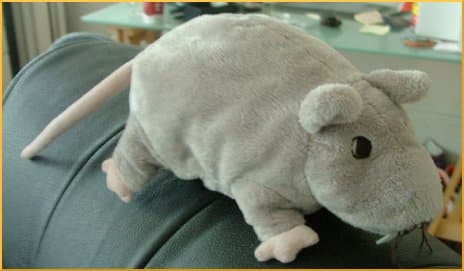
For the Washington Post, Marlene Cimons reported on recent studies concerning adenovirus 36, which causes increased fat and weight in various animals including mice, rats, monkeys and chickens. In humans, adenovirus 36 causes upper respiratory infections, and it also appears to be associated with childhood obesity. The authority quoted on the subject is Richard L. Atkinson, clinical professor of pathology at Virginia Commonwealth University, and head of the Obetech Obesity Research Center, who says:
It’s a slow process that works by changing your metabolic rate. It takes a year or two to get really obese after you’ve been infected. If you look at a given fat pad from an infected animal and compare it to an uninfected animal, it’s got bigger fat cells and more of them.
Cimons mentions a 2012 study in India where 1,400 people were tested for adenovirus 36 antibodies, and the positive antibody group “gained significantly more body fat over a 10-year period than those who had not been infected.” One of the researchers, Dr. Nikhil V. Dhurandhar, has degrees in biochemistry and nutrition, and now works at the Pennington Biomedical Research Center in Baton Rouge, La. He has been studying obesity of infectious origin for 20 years, and back in India treated more than 10,000 cases of obesity.
The National Center for Biotechnology Information website lists six scholarly papers using the term “infectobesity,” including a couple whose titles have disturbing implications — “Can obesity be an infectious disease?” and “Obesity and infection: two sides of one coin.” The latter originates from Italy’s Università del Piemonte Orientale and says:
The etiology of obesity is multifactorial, and genetic inheritance and behavioral/environmental causes are considered the main etiological factors. Moreover, evidence that specific infections might promote the development of obesity has steadily accumulated.… Several microbes have been considered as possible promoter of obesity, but most of the data concern adenovirus-36 that exerts an adipogenic action mainly via a direct effect on adipose tissue leading to weight gain, at least in animal models.
This particular idea is not new. Five years ago, microbiologist and epidemiologist Whitney Baker addressed the subject of infectious obesity. Adenovirus 36 was implicated then, along with three other human viruses and five animal viruses, all of which displayed a convincing link to obesity. Some regard “infectobesity” theories as distractions from the main point, which is that people eat too much of the wrong foods, probably because they are addicted.
But Baker brings up a point about suspected infectious etiologies that is hard to ignore. Some of the etiological theories that originally sounded like crackpot ideas turned out to be true. Peptic ulcers come from bacteria; cervical cancer and liver cancer come from viruses. Still, she feels that consumers are not qualified to have opinions on this sort of thing, because they start demanding the impossible. And the media? Completely out of control. She writes:
They’re not going to say there “may” be a link and an infectious agent “may” be a contributory factor to gaining weight. They’re not going to highlight that there is still a strong behavioral component to obesity, and most likely diet and exercise are the best ways to be healthy and to slim down. No, they’ll go for the attention grabber. And in return, a number of people (those who donate to the weight-loss industry in particular) might have visions of “cure me” rather than taking personal responsibility for where they are at and how they got there.
Your responses and feedback are welcome!
Source: “Can an upper-respiratory infection make you fat?,” WashingtonPost.com, 12/09/13
Source: “Nikhil V. Dhurandhar, PhD,” Obesity.org
Source: “Obesity and infection: two sides of one coin,” NIH.gov, 10/22/13
Source: “The ‘Skinny Shot’ and Media Accountability,” ScienceBlogs.com, 02/26/08
Image by rashida s. mar b.

 FAQs and Media Requests:
FAQs and Media Requests: 












One Response
I am certain I am an infectobesity victim. From my experience it worked as follows : I got mumps, the virus did not affect my parotis glands, but my pancreas, and ever since I started gaining weight, because my pancreas produced way too much insulin for my needs, hence sugar cravings etc… Came to this conclusion after haviing been diagnosedd with diabetes 2, and rigurously flollowing the prescribed treatment, I had put on 20 kg of weight, where only the insulin had been a change in my life. I halved the insulin and since lost 14 kgs. Maybe someone somewhere can get to the scienrific background, and more people like me will be helped in the future.